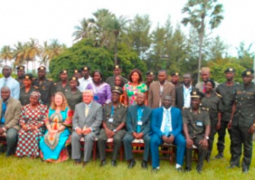Over the years, we have been shooting ourselves in the foot by engaging in land use practices that are really affecting our very livelihood and endangering our lives.
This is because we have continuously been mismanaging and misusing the land through deforestation, overgrazing, fuel wood consumption, poor agricultural practices, and unprecedented rate of urbanization leading to land degradation.
It is, therefore, essential that the state authorities and the people take concrete actions to reverse this situation, for it would continue to cause serious harm to our environment and our very lives as inhabitants of the land.
Already, we are experiencing a loss of vegetable cover and ruin in the quality of our agriculture and livestock, fisheries, and biodiversity.
There is also environmental degradation such as salt water intrusion into the fresh water zone, soil salinization and erosion, as well as decreasing fertility of the arable land.
The rate of land degradation, according to our minister of the Environment, is further accelerated by rampant bush fires causing denudation of the vegetative cover.
“In addition to its impact on vegetation cover, bush fires indiscriminately eliminate habitats for wildlife and negatively affect natural processes of pest control,” the minister said, adding that poverty, population growth and natural factors such as extreme climate events significantly accelerate the process of land degradation.
We can, therefore, say that our land as nation is part of the global estimated 1.97 billion hectares of usable land that have been affected by various forms of human-induced land degradation.
We, therefore, need concrete action to curb this worrying trend of desertification, land degradation and drought called DLDD.
As the minister says, sustainable land management, institutional collaboration and cooperation, and the creative sourcing of funds are necessary for addressing DLDD.
The Gambia has been implementing various programmes and projects to combat land degradation since the Sahelien Drought of 1970s, but “the interventions to combat land degradation have largely been a piecemeal approach through individual sector plans and without a macro-level policy and strategic perspective”.
Hence we need concrete actions this time around to forestall this confrontational trend of DLDD, even as our policymakers meet at the Baobab Holiday Resort to validate the National Action Programme to Combat Desertification in The Gambia.
“Unless we practice conservation, those who come after us will have to pay the price of misery, degradation, and failure for the progress and prosperity of our day.”
Gifford Pinchot


